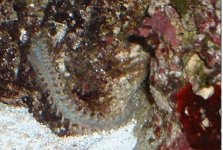You are using an out of date browser. It may not display this or other websites correctly.
You should upgrade or use an alternative browser.
You should upgrade or use an alternative browser.
Can you identify this critter? Is it a BRISTLE worm?
- Thread starter Mal
- Start date
Mal,
That animal is a polychaete worm, often referred to by the common name "bristleworm" although I don't really like that term because it means very different things to different people. Regardless, in general these animals are harmless or even beneficial scavengers in most reef tanks, because together with a multitude of small arthropods, polychaete worms fill more-or-less the same ecological role as do insects on land. Having said that, I have to say that there are definitely some worms that can be problematic (e.g., check out the jaws of the the Bobbit worm seen in this picture waiting for a fish to touch it) -- just like there are some insects (like wasps, for example) that you'd prefer to avoid, for the most part we ignore "bugs" around us. Beyond just ignoring them, many of them are actually beneficial, or at least provide food for many animals higher up in the food chain.
Polychaete worms fall pretty much into the same category, especially in reef tanks. These worms are extremely abundant in all marine habitats, and there is not a reef tank in existence that could AVOID having at least a few polychaetes in it. Most reef habitats that have been studied to date find on the order of 10-20,000 worms per square meter, and in some muddy bottom areas with high organic input, densities ofworms can reach over *half a million* per square meter! So having said that, chances are good that every reef tank in existence will have at least a few worms in it.
I explain a lot more about worms and which ones are good, bad, and indifferent in the Bristleworm FAQ, so I suggest that as a good place to find a lot more information about your animal.
Hope that helps...
Rob
That animal is a polychaete worm, often referred to by the common name "bristleworm" although I don't really like that term because it means very different things to different people. Regardless, in general these animals are harmless or even beneficial scavengers in most reef tanks, because together with a multitude of small arthropods, polychaete worms fill more-or-less the same ecological role as do insects on land. Having said that, I have to say that there are definitely some worms that can be problematic (e.g., check out the jaws of the the Bobbit worm seen in this picture waiting for a fish to touch it) -- just like there are some insects (like wasps, for example) that you'd prefer to avoid, for the most part we ignore "bugs" around us. Beyond just ignoring them, many of them are actually beneficial, or at least provide food for many animals higher up in the food chain.
Polychaete worms fall pretty much into the same category, especially in reef tanks. These worms are extremely abundant in all marine habitats, and there is not a reef tank in existence that could AVOID having at least a few polychaetes in it. Most reef habitats that have been studied to date find on the order of 10-20,000 worms per square meter, and in some muddy bottom areas with high organic input, densities ofworms can reach over *half a million* per square meter! So having said that, chances are good that every reef tank in existence will have at least a few worms in it.
I explain a lot more about worms and which ones are good, bad, and indifferent in the Bristleworm FAQ, so I suggest that as a good place to find a lot more information about your animal.
Hope that helps...
Rob






